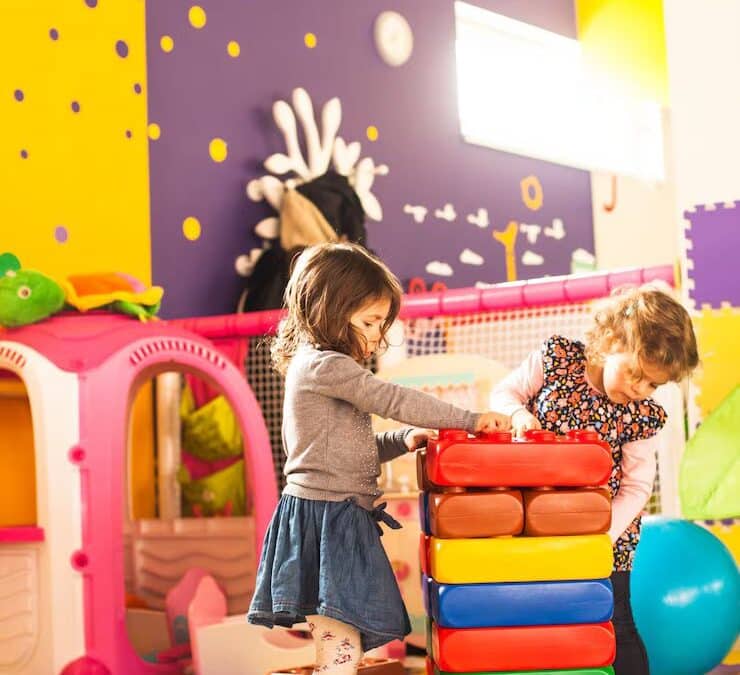Selecting the right infant daycare center is a crucial decision for any parent. It’s not just about finding a place that provides care; it’s about choosing an environment where your child can feel safe, nurtured, and encouraged to grow. The process of touring daycare centers becomes pivotal in making an informed choice. This is where asking the right questions comes into play.
When you go on a tour, it’s important to have specific questions prepared. These questions will help you determine if the facility meets your expectations and your child’s needs. By focusing on key areas such as safety protocols, staff qualifications, and developmental support, you can gain a better understanding of the daycare’s standards.
Why Asking Questions Matters:
- Ensures your child’s safety.
- Evaluates the quality of care and educational support.
- Helps assess compatibility with your family’s values.
A well-prepared parent asks not only about daily schedules and activities but also digs deeper into licensing standards and emergency preparedness. This strategic questioning ensures that you’re not just choosing any daycare but selecting one that genuinely caters to your infant’s well-being and growth.
1. What are the Licensing and Accreditation Standards?
When considering an infant daycare center, understanding its licensing and accreditation status is crucial. These standards offer assurance of a safe and high-quality environment for your child. A licensed daycare complies with state regulations designed to protect children’s welfare and support their development. Accreditation from reputable organizations often signifies adherence to higher quality benchmarks.
Key Questions to Ask:
- Is the daycare center licensed? Confirm that the center holds a current license from the relevant state authorities.
- What accreditations does the center hold? Look for accreditations from recognized bodies like the National Association for the Education of Young Children (NAEYC).
- What are the state regulations for infant care? Understanding these can help you evaluate how well the center adheres to mandatory safety and educational guidelines.
Staff Qualifications:
Ensuring that staff members are well-qualified is another critical aspect. This includes verifying their training, experience, and background checks:
- Are all staff members trained in first aid and CPR? This training is essential for handling emergencies effectively.
- What are the staff’s educational qualifications? It’s beneficial if caregivers have early childhood education credentials or similar qualifications.
- Have background checks been conducted on all employees? These checks are vital for ensuring a safe environment free from any past criminal behavior.
A daycare’s commitment to licensing and accreditation reflects its dedication to maintaining high safety and quality standards. When visiting potential centers, keep these questions in mind to ensure they meet your expectations for your child’s care and well-being.
2. What is the Staff-to-Child Ratio?
The adult-to-child ratio is a critical factor in determining the quality of care and supervision your child will receive at an infant daycare center. Understanding these ratios allows you to gauge how much attention and care your infant will get, which directly impacts their safety and development.
Recommended Ratios for Infants
For infants under 12 months, a commonly recommended staff-to-child ratio is 1:3 or 1:4. This means one caregiver should be responsible for no more than three or four infants.
These recommendations can vary by state, so it’s important to inquire about the specific requirements in your area.
Impact on Individual Attention and Care Quality
A lower staff-to-child ratio can significantly benefit your child’s experience at daycare. With fewer infants per caregiver, staff can provide:
- More personalized attention to each child
- Increased opportunities for engaging in developmental activities
- Enhanced ability to monitor health and safety needs
Assessing Adequate Supervision During Your Visit
When touring a daycare center, observe how caregivers interact with children:
- Engagement: Are caregivers actively engaging with infants through play and conversation?
- Responsiveness: Do they respond promptly to the needs of each child?
- Observation: Look for signs of stress or fatigue among staff, which might indicate they are overburdened.
Asking pointed questions about the average daily attendance and how staffing levels are adjusted during peak times can provide further insight into their commitment to maintaining proper supervision standards. By understanding these factors, you can make an informed decision regarding your child’s care environment.
3. What Health and Safety Protocols are in Place?
Ensuring your child’s safety in an infant daycare center is paramount, making it crucial to inquire about the health protocols in daycare settings. Establishing a clear understanding of these procedures can provide peace of mind and help you assess if the environment is secure and well-maintained for your little one.
Key health protocols should include:
- Cleaning Procedures: Daycare centers must adhere to stringent cleaning routines to maintain a hygienic environment. Ask about the frequency of cleaning and sanitization practices, particularly for high-touch surfaces like toys, cribs, and changing stations. Inquire whether they follow any specific guidelines or standards for cleaning agents used.
- Illness Management: Understanding how the center deals with sick children is vital. Questions to consider include: What is their policy for handling children who become ill during the day? How do they manage communicable diseases? Are there specific measures in place for managing outbreaks, such as COVID-19?
- Emergency Response Plans: Emergencies can occur unexpectedly, so it’s important to know how prepared the daycare is to handle such situations. Find out if staff members are trained in first aid and CPR. Ask about their protocols for fire drills or other emergency scenarios to ensure they have robust plans in place.
Knowing these aspects will help you make an informed decision about the daycare’s commitment to maintaining safety measures in daycare centers. This understanding is essential when evaluating potential options to secure a safe environment for your child among the “10 Questions to Ask When Touring an Infant Daycare Center”.
4. How is the Daily Schedule Structured? Are there Developmental Activities?
Understanding the daily schedule in infant daycare centers is crucial for ensuring a nurturing environment that promotes growth. Infants thrive on consistency, which makes structured activities vital for their development. They help children feel secure and provide opportunities for learning through play.
When touring a daycare center, pay attention to the variety of activities offered throughout the day. Look for a mix of:
- Sensory Play: Activities that stimulate touch, sight, and hearing are essential for cognitive development.
- Motor Skills Development: Opportunities for infants to practice crawling, reaching, or grasping objects help develop both fine and gross motor skills.
- Language Exposure: Reading time or singing can enhance language acquisition and listening skills.
A typical day at daycare might include a balance of playtime, nap periods, feeding routines, and quiet moments. Observing these elements during your visit can provide insight into the center’s approach to developmental activities in daycare.
It’s important to ask specific questions about how the center supports developmental milestones. Inquire about:
- Individualized Attention: How do caregivers tailor activities to suit each child’s developmental stage?
- Activity Variety: Are there periodic changes to activities to ensure children remain engaged?
- Developmental Milestones Tracking: Does the staff keep records of each child’s progress and share updates with parents?
These insights will help you determine if the daycare is well-equipped to foster your child’s growth while providing enriching experiences tailored to their needs.
5. How is Meal Provision Managed? Are there Considerations for Dietary Restrictions?
Ensuring proper nutrition for infants in daycare settings is crucial as it impacts their growth and overall health. As you tour a daycare center, inquire about their approach to meal provision. Understanding how meals are managed can offer insights into the center’s dedication to fostering healthy eating habits.
Questions to Ask About Meal Planning and Menu Options
Begin by asking specific questions about meal planning and menu options provided by the center:
- Does the daycare supply meals, or are parents required to pack them?
- If meals are provided, what types of foods are typically included on the menu?
- How often is the menu rotated or updated to ensure variety?
- Are meals prepared on-site, or does the center use an external catering service?
Questions to Ask About Dietary Restrictions and Allergies
Dietary restrictions and allergies require special attention in any setting involving young children. Explore how the daycare handles these considerations:
- What procedures are in place for managing food allergies or dietary restrictions?
- How does the staff ensure that children receive meals that cater to their individual dietary needs?
- Are there opportunities for parents to communicate specific requirements or updates regarding their child’s diet?
The ability of a daycare center to effectively manage dietary restrictions in daycare meals speaks volumes about their commitment to each child’s well-being. Ensuring that your child receives nutritious and safe meals tailored to their specific needs provides peace of mind and supports their development during these formative years.
When assessing meal provision policies, consider observing a meal session if possible. This offers valuable insights into how staff interact with children during mealtimes and how they handle any potential dietary concerns directly.
6. How is Communication with Parents Facilitated? Are there Daily Reports or Child Development Updates?
Understanding the parent communication in infant daycare centers is crucial for maintaining a strong connection between caregivers and families. This aspect determines how informed you will be about your child’s daily experiences, progress, and any concerns that may arise.
Effective communication ensures you are aware of your child’s activities, emotional well-being, and developmental milestones. When touring a daycare center, consider asking specific questions to gauge how communication is handled:
- What systems are in place for daily updates? Inquire if the center provides daily reports that detail your child’s meals, naps, diaper changes, and activities.
- How are developmental milestones communicated? Ask whether periodic updates on your child’s growth and achievements are shared. This can include formal meetings or written summaries.
- Is there a preferred method of communication? Some centers may use digital apps to send real-time updates and photos, while others might prefer phone calls or face-to-face meetings.
- How are urgent matters communicated? Understanding the protocol for emergencies or immediate concerns is vital. Ensure there’s a reliable way for staff to reach you promptly.
- Are parent-teacher conferences available? Regular meetings can provide insights into your child’s development and address any questions you might have.
Knowing these details helps build trust and ensures that you feel actively involved in your child’s daycare experience. Establishing an open line of communication also enables caregivers to tailor their approach to better meet your child’s individual needs.
7. What Safety Measures are Implemented to Ensure a Secure Environment? Are There Protocols for Child Protection?
Ensuring the safety of infants in daycare centers is paramount. When evaluating a facility, it’s critical to understand the safety measures in infant daycare centers that are implemented to create a secure environment. Here are key areas to focus on:
1. Secure Entry Points
Inquire about how the center controls access to the facility. Look for features such as:
- Keypad entry systems or electronic locks
- Visitor sign-in protocols
- Surveillance cameras monitoring entrances and exits
2. Sleeping Practices
Safe sleep environments are crucial for infants. Ask about:
- Adherence to the Safe Sleep Guidelines recommended by pediatricians
- Utilization of cribs that meet safety standards and avoid hazards like pillows or blankets
- Regular checks during nap times to ensure infants’ well-being
3. Playtime Supervision
Accidents during play can be minimized with proper oversight:
- Verify that the staff-to-child ratio allows for adequate supervision
- Observe how caregivers engage with children during both indoor and outdoor activities
- Ensure that play equipment is age-appropriate and regularly maintained
4. Child Protection Protocols
Protection from abuse and neglect is non-negotiable:
- Confirm the daycare’s policies on child protection and reporting suspected abuse
- Inquire about staff training on child protection laws and procedures
By asking these questions, you gain insight into how committed a daycare center is to maintaining a safe and nurturing environment for your child. Each of these elements plays a vital role in creating an environment where your infant can thrive securely, providing peace of mind as you choose the right facility for your family.
8. What are the Policies on Discipline and Behavior Management Strategies? How is Conflict Resolution Handled Among Infants?
When evaluating infant daycare centers, understanding the discipline policies in infant daycare centers is crucial. These policies not only reflect the center’s approach to maintaining harmony but also highlight their strategies for nurturing a supportive environment for infants.
Written Discipline Policy
Begin by examining the written discipline policy at the center. Each facility should have a documented approach detailing how they manage behavior and discipline. This document might include:
- Prohibited Practices: Look for any statements prohibiting harmful or punitive measures.
- Positive Reinforcement: Check if the center uses positive reinforcement techniques to encourage desirable behaviors.
- Staff Training: Inquire about staff training in child psychology and conflict resolution.
Understanding these aspects will give you insight into how your child’s behavior will be guided.
Approaches to Handling Behavioral Issues
Infants and toddlers are naturally curious, which can sometimes lead to challenging behaviors. It’s essential to know how caregivers address these situations:
- Gentle Redirection: Ask if caregivers use gentle redirection techniques, guiding infants away from undesirable actions toward more positive ones.
- Developmentally Appropriate Responses: Ensure that responses are age-appropriate, taking into account each child’s developmental stage.
Consider scenarios where conflict might arise among infants, such as sharing toys or personal space. Question how caregivers mediate conflicts to foster sharing and cooperation skills.
Conflict Resolution
Understanding conflict resolution strategies is equally important. Caregivers should model calm and fair behavior:
- Role of Caregivers: Inquire whether caregivers intervene promptly and appropriately during disputes.
- Promoting Social Skills: Look for evidence that the center focuses on developing social skills like empathy and patience through everyday interactions.
Evaluating these factors provides a comprehensive view of how a daycare center supports emotional growth while ensuring a peaceful setting for all children involved.
9. How Prepared is the Center for Emergencies? Are Drills Conducted Regularly with Children? What is the Response Plan for Natural Disasters?
Ensuring that an infant daycare center is prepared for emergencies is crucial for your child’s safety. When evaluating potential daycare options, asking about their emergency preparedness plan can provide peace of mind.
1. Emergency Preparedness Plan
A robust plan should cover a range of scenarios, from medical incidents to natural disasters. Inquire if the center has a documented procedure detailing steps to be taken in various emergencies.
2. Frequency of Drills
Regular drills help familiarize both staff and children with emergency protocols, ensuring swift and coordinated responses during actual events. Ask how often these drills are conducted and whether they encompass situations like fire evacuations or lockdowns due to external threats.
3. Response Plans for Natural Disasters
It’s essential to understand the specific measures in place for natural disasters prevalent in your area, such as earthquakes, tornadoes, or floods. Ask if there are designated safe zones within the facility and what communication strategies are employed to keep parents informed.
Engaging with the center on this topic not only clarifies their readiness but also highlights their commitment to prioritizing children’s safety during unforeseen circumstances. Consider asking:
- Are all staff trained in implementing emergency procedures?
- How do they ensure that infants are safely evacuated during emergencies?
- What role do caregivers play in maintaining calm among children?
By addressing these critical points, you gain insight into the center’s capability to protect your child and manage crises effectively.
10. Is There Flexibility in Operating Hours? What is the Late Pick-Up Policy Like? Are There Different Enrollment Options Available?
When selecting an infant daycare center, understanding the operating hours flexibility can be crucial for aligning with your family’s schedule. Many centers offer extended hours to accommodate working parents, yet it’s essential to confirm if this aligns with your specific needs. Ask about:
- Standard Operating Hours: Know the regular opening and closing times. This will help you plan your daily routine effectively.
- Extended Hours: Inquire if there are options for early drop-off or late pick-up and any associated fees. Often, daycare centers offer these services for parents with unpredictable work schedules.
- Late Pick-Up Policy: Understanding these policies will prevent unexpected charges and ensure you have a backup plan if you’re delayed. Some centers may charge by the minute, while others might have a flat late fee.
Enrollment options also vary between daycare centers, often catering to diverse family needs. Here are some common configurations:
- Full-Time Enrollment: Ideal for families needing consistent care throughout the week. This option typically provides stability in both routine and caregiving.
- Part-Time Enrollment: Suitable for those who only require care on certain days or part of the day. Check if the center offers this flexibility without compromising on care quality or developmental activities.
Understanding these elements ensures that your chosen daycare not only supports your child’s development but also fits seamlessly into your family’s lifestyle, providing peace of mind as you navigate daily commitments.
Making an Informed Decision When Choosing an Infant Daycare Center Based on Tours
Selecting the right infant daycare center is crucial for your child’s safety and development. By asking the right questions during your tour, you gain insight into how well a facility aligns with your family’s needs.
- Prioritize Safety: Ensure that the daycare center has robust safety protocols, proper licensing, and qualified staff to create a secure environment for your child.
- Focus on Development: Look for facilities offering structured daily schedules and developmental activities. These are essential for nurturing your child’s growth and reaching developmental milestones.
- Evaluate Communication: Choose a center that maintains open lines of communication with parents, providing regular updates about daily activities and any issues that arise.
These considerations will help you make an informed decision when choosing an infant daycare center based on tours. Keep these 10 questions in mind to ensure you select a nurturing and suitable environment for your child. Your proactive approach will contribute significantly to your child’s well-being, enabling them to thrive in a supportive setting.












